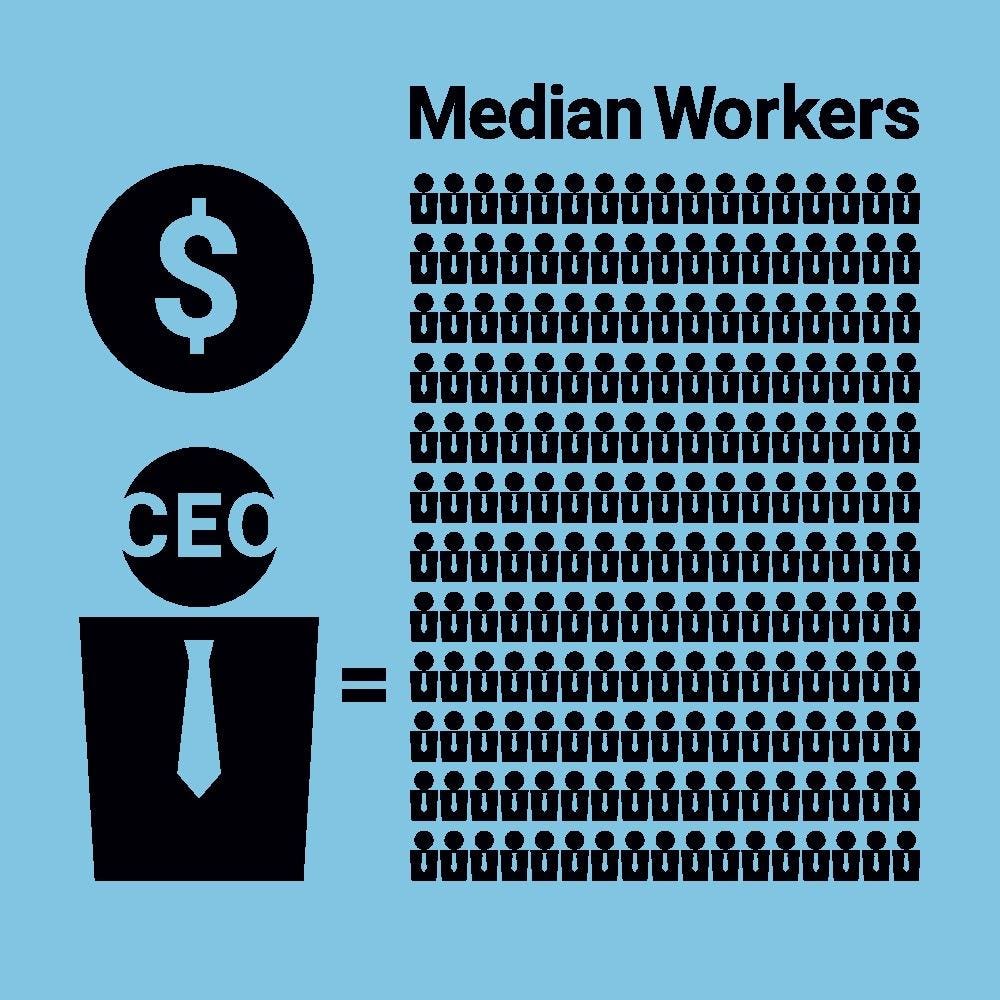Despite record-breaking heat waves across the U.S, and around the world minimizing pollution, reducing environmental impact and combating global climate change are not top priorities for the public according to a new report from JUST Capital. The estimated probability that a random respondent would rank “combats global climate change by reducing its own emissions” as a corporate priority is 2.6 percent. Instead, the probability that respondents would judge a worker-related issue as the most important aspect of “just” corporate behavior is 44%.
Out of five corporate behaviors that are concerns for the public, four are worker related. In order of priority, these include paying workers fairly and offering a living wage that covers the cost of basic needs at the local level, creating jobs in the U.S. and providing employment opportunities for people that need them, protecting the health safety and well-being of workers beyond what is required by law, and focusing on workforce retention and employee advancement by providing training, education, and career development opportunities.
At the same time as the public has made worker-related issues including fair pay a top priority, publicly traded American companies are rewarding their top executives with compensation packages that are breathtakingly high – in absolute terms, in relation to the financial performance of their companies, and in comparison to the pay of ordinary workers. Many of these same companies also claim to be socially responsible and to be acting in the best interests of their stakeholders, including employees.
In 2022 the S&P 500 dropped 19.4 percent but the median compensation for C.E.O.s who had been in their jobs for at least two years was $14.8 million according to executive compensation research firm Equilar. It would take average workers at companies run by these C.EO.’s 186 years to earn what their leaders did in the same year. These numbers pale in comparison to the gap between the compensation of the very best-paid executives and what ordinary workers were paid.
Given the importance that Americans place on treating workers fairly, I thought it was important to have a closer look at the intersection of executive compensation, public opinion and corporate responsibility in the companies with the highest paid C.EO.s. In 2022 these were Alphabet, Hertz, Peloton Interactive and Live Nation Entertainment, according to Equilar.
Topping the list is Sundar Pichai of Google’s parent, Alphabet, who was awarded $225,985,000 in 2022. Even though the median worker at Google earned a hefty $279,802 it would still take 808 years of work to reach Pichai’s compensation in 2022 according to the New York Times. The public ranked Alphabet 82nd on C.E.O. to median-worker pay, 95th on pay equity, and 24th in fair pay according to JUST Capital.
In terms of corporate responsibility, Google is “committed to significantly improving the lives of as many people as possible” and “building a world where progress, equitable outcomes, diversity, and inclusion can be realities both inside and outside our workplace.” Part of Google’s commitment to social change is led by Google.org, a non-profit organization with a mission to “bring the best of Google to help solve some of humanity’s biggest challenges.” The company’s strong social purpose is reflected in its high ranking in Just Capital’s category of community development.
Number two on the list is Stephen M. Scherr of Hertz who received compensation of $182,136,137 in 2022 – 4,983 times the pay of the median Hertz employee. The public’s view of Hertz isn’t good. The company came in at 710th out of 951 companies on C.E.O. to median-worker pay, 380th on pay equity, and had a fair pay rating of 895th. In terms of corporate responsibility, Hertz views corporate responsibility as “a long-term journey, not a destination.” Looks like they have a very long road ahead in this area.
Barry McCarthy of Peloton Interactive finished in third place with compensation of $168,073,420, which was 2,299 times what the median employee was paid. Peloton was 607th on C.E.O. to median-worker pay, 95th on pay equity and was 20th in fair pay. In terms of social responsibility, Peloton’s actions are anchored in the Peloton Pledge, a “concrete action plan to combat systemic inequities” that includes its anti-racist vision, partnering with organizations that help ensure mental health and physical fitness are accessible to everyone, and tracking and reporting on sentiment around inclusion, community and representation across its member community.
Despite what seems like a solid approach to addressing inequity, Peloton’s actions in this space didn’t track well with the public. For example, the company scored 769th in the area of Human Rights (“Respects and advances basic human rights with business partners across its supply chain and in countries where it operates.”).
At Live Nation Entertainment, C.E.O Michael Rapino came in at fourth place with compensation in 2022 of $139,005,565, 5,414 times more than the wages of the company’s median worker. The public ranked Live Nation 741st on C.E.O. to median-worker pay, 380th on pay equity (tied with Hertz) and 698th on fair pay.
According to Live Nation’s website, the company needs to be as diverse as the fans and artists it serves. The company says it is committed to improving its promotion of diversity within its company and the world at large. The public’s view of diversity, equity and inclusion at Live Nation tells a very different story. The company ranked first in discrimination controversies, first in Equal Employment Opportunity Commission Violations and Worker Grievance Fines and 754th in workforce demographics.
The fair treatment of workers is what matters most to the American public but this is far from what is actually happening in companies led by the highest paid C.E.O’s in the country. Many of these companies are also using ESG (environmental, social, and corporate governance), corporate responsibility and DEI (diversity, equity and inclusion) as performative smokescreens to mask unethical behaviors.
Capitalism can be harnessed to help to solve the world’s most pressing problems. Doing that starts with paying employees better, reducing the gap between the highest and lowest paid people, and improving performance in other aspects of the work experience that are included in JUST Capital’s JUST Jobs Scorecard. Beyond that, corporate leaders need to ensure their ESG initiatives are authentic, aligned with corporate strategy including human resources and contributing to meaningful and measurable social impact.
Read the full article here










